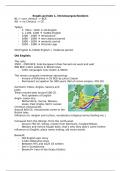Engels periode 1, literatuurgeschiedenis
BC-> voor christus -> BCE
AD -> na Christus -> CE
Tijdlijn;
- C. 700-c. 1100 old English
- C. 1100- 1500 middle English
- 1500 – 1660 renaissance
- 1660 – 1800 neo-classical period
- 1800 – 1830 romantic period
- 1830 – 1900 Victorian age
Old English & middle English = medieval period.
Old English;
The celts.
3500 – 2500 BCE; Indo-European tribes fanned out west and east
800 BCE; Celtic settlers in British Isles
- Celtic languages now; Gaelic & Welsh
The roman conquest (romeinse verovering)
- Invasie of Britainne in 55 BCE by julius Caesar
- Permanent occupation for 400 years (fall of roman empire; 476 CE)
Germanic tribes; Angles, Saxons and
Jutes.
Tribes moved west around 500 CE.
- First speakers of English
Anglo- saxon era;
- Nothurnbria, mercia, Wessex,
essex, East Anglia, Kemt, sussex
Christian missionaries.
Around 600 CE, missionaries came to the
British Isles.
Influence on; religion and culture, vocabulary (religious terms (bishop etc.)
Conquest from the Vikings. From the north-west.
- Around 750 CE, Viking, mostly from Denmark, invaded Britain.
- Wessex and mercia fought back, that’s why they didn’t come further
Influence on English; place name ending, old norse words.
Beowulf;
- Old English epic story
- 3,182 alliterative lines
- Between 975 and 1025 CE written
- Set in Scandinavia
- Beowulf= hero of the Geats (Goths)
, Comes to the aid of Hrothgar, the king of the Danes, to help
defeat the monster Grendel. Later on, he also kills Grendel’s
mother, and years later; a dragon.
So 3 enemies
- Beowulf as character; strong (true warrior), boasts, but is not seen
as arrogant. Later on; wise and a great king.
- Has some Christian elements.
Themes;
Germanic/pagan
-loyalty to chief and tribe
-vengeance to enemies
Christian;
-fight against evil (& victory)
-sacrificial death
Beowulf is part of the Anglo-Saxon oral tradition.
Summary;
Beowulf hears of his neighbors’ plight and sails to their aid with a band of
warriors. Beowulf encounters Grendel in unarmed combat and deals the
monster its death-blow by tripping of its arm.
There is much rejoicing among the Danes, but Grendel’s loathsome
mother takes her revenge and makes a brutal attack upon the king’s hall.
Beowulf seeks out the hag in her underwater lair and slays her after an
almighty struggle. Once more there is much rejoicing and Beowulf is
rewarded with many gifts. The poem culminates 50 years later, in
Beowulf’s old age. Now king of the Geats, his own realm is faced with a
rampaging dragon, which had been guarding a treasure-hoard. Beowulf
enters the dragon’s mound and kills his foe, but not before he himself has
been fatally wounded.
Reader page 92 93, learn how grendol dies!
Grendel's death represents a significant victory for Beowulf and ends the
terror in Hrothgar's kingdom.
He dies from his injuries in an underwater cave.
Middle English;
Old English became middle English because;
- The norm conquest.
1066; William the Conqueror (from Normandy, later; William I of
England)
Anglo-norman French became the language of the kings and
nobility of England for more than 300 years because of the
norman conquest.
95% of the population (lower classes) kept speaking English
French had a big influence on English; for example. Words like; colour,
language, poet, question, castle, crown, prince, court, beef, bacon etc. etc.
Gevolg; 85% of Anglo-saxon words were lost after Viking (old Norse) and
Norman (old French) invasions.
- English language saved by;





